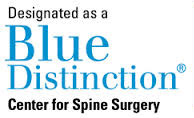6 Causes of Upper Back Pain
When we talk about back pain we’re often talking about lower back pain. But what about upper back pain? While less common, it does occur. Here are some reasons people may develop upper back pain.

Causes of Upper Back Pain
Some potential causes of upper back pain are:
- Injury
- poor posture
- Herniated disc
- Osteoarthritis
- Compression fracture
- Congenital condition
If you sustain an injury it may be obvious where your upper back pain is coming from. If you haven’t, it may be more difficult to diagnose the cause.
Poor Posture
Poor posture can lead to a lot of aches and pains. When you don’t sit or stand properly you can actually change the curvature of your spine. In addition, poor posture can cause the overuse of some muscles and lead to others becoming weaker.
In recent years, the more prevalent use of technology has lead to a condition known as forward head posture (also known as tech neck). Spending hours looking down at a cell phone or laptop, with your neck in an unnatural position, can force changes within the cervical spine. These changes can put pressure on the nerves that communicate with the muscles in your upper back, resulting in muscle spasms and shoulder or upper back pain.
Herniated Disc
In between each bone, vertebrae, in our spine is a disc known as an intervertebral disc. These gelatinous discs create a cushion between the bones. Each disc is made of gelatinous material surrounded bye a thicker material, like a skin. Damage to a disk can result in the inner material “leaking” out. This is call a herniated disc. As the disk spreads out, it can press on nerves, causing spasms or shooting pains. Also, the disk can fail to perform its primary function. With too much damage to the disk, adjacent bones within the spine may rub up against each other causing pain.
Osteoarthritis
Cartilage within the joints also helps prevent the bones from rubbing together as the joint moves. Breakdown of this cartilage can cause stiffness and pain within joints. This is known as osteoarthritis. If the change in the joint puts pressure on a spinal nerve this can also result in numbness. Osteoarthritis in the neck or cervical region could put pressure a nerves in the upper back, creating spasms or upper back pain.
Compression Fractures
A compression fracture is a specific type of bone break. are common in individuals whose bones have become brittle as with osteoporosis. (Read more about osteoporosis here.) When the bones are brittle the weight and downward pressure on the vertebrae can cause them to break. Depending on how healthy the bones are, a compression fracture can occur as a result of an injury or, in individuals with extremely brittle bones, can be the result of a sudden movement like a sneeze.
Congenital Conditions
Some individuals are born with, or develop, abnormalities to the spine. Conditions like scoliosis and kyphosis may develop with no known cause. These conditions affect the way the spine grows an alter its curvature. Unnatural curvature of the spine can affect an individual’s posture or body shape. Depending on the severity and location of the abnormality, one of these congenital conditions could result in upper back pain.
Though less common, you can develop upper back pain. Knowing the cause of your upper back pain will help you and your doctor develop a proper treatment plan.
Resources
